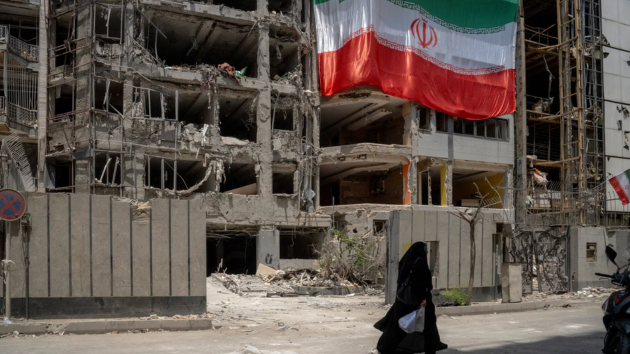
(LONDON) -- Iranian and European delegations are expected to gather in Istanbul, Turkey, on Friday for fresh talks on Tehran's nuclear program, with European nations warning that a failure of negotiations may prompt punishing "snapback" sanctions on Iran.
Representatives from the U.K., France and Germany -- known as the E3 -- will attend the negotiations in Istanbul, hoping to forestall further direct conflict over Tehran's nuclear program following an intense 12-day Israeli-U.S. military campaign last month.
The last meeting between the parties took place on May 16, also in Istanbul. Friday's instalment will be held one month after the end of fighting in the 12-day conflict between Iran and Israel, which saw the U.S. strike several targets in Iran.
The three European nations -- along with the U.S., Russia and China -- were signatories to the 2015 Joint Comprehensive Plan of Action nuclear deal, which restricted Tehran's nuclear program. President Donald Trump withdrew from the accord in 2018.
The U.S. wants Iran to end all uranium enrichment. The European nations have yet to make clear their position. The JCPOA limited Iran to enriching uranium up to 3.67% purity -- sufficient for civilian nuclear power purposes but below the 90% purity needed for use in a weapon.
If a deal is not reached by Aug. 29, European nations have threatened to implement a so-called "snapback" mechanism that automatically reimposes all United Nations Security Council sanctions that were lifted as part of the JCPOA.
Ellie Geranmayeh of the European Council on Foreign Relations think tank told ABC News that the past month was needed "for the dust to settle in Tehran after the attacks, but also to allow the E3 to have a better understanding of where the U.S. position is on the Iranian nuclear program, post-strikes."
"I think they now have a better assessment," she said. "I still don't think it's as strong of a picture as they would hope."
The U.S. will not take part in Friday's talks. "We have no plans at the current situation for talks with the United States," Iran's Ministry of Foreign Affairs spokesperson, Esmaeil Baghaei, said during a Monday press conference.
President Donald Trump is continuing to claim that June's strikes "obliterated" Iran's key nuclear facilities, dismissing leaked intelligence reports suggesting that the damage done to the sites was not as extensive as the White House claimed.
"We will do it again, if necessary!" Trump wrote on social media late Monday.
Friday's meeting, Geranmayeh said, will likely be focused on the snapback sanctions timeline. The snapback mechanism expires in October. The E3 may push to extend its provision for "six months to a year," Geranmayeh added, if such a proposal wins support at the UNSC.
This would give more "breathing room" for Tehran and Washington to resume diplomacy" while maintaining Western leverage over Tehran, she said.
Whether the U.S.-Iran negotiating track can be revived remains to be seen.
There are "big question marks" as to Trump's intentions, Geranmayeh said, and "whether he sees a need to expend the political cost domestically necessary to get a deal done with the Iranians, or if he's happy to just kick the can down the road."
In that case, the president could sporadically "give a green light to the Israelis to go in and strike to set back Iran's nuclear activity," she said.
There is "a real worry for both the Europeans and the Iranians, that the president, the U.S., is no longer actually invested or interested in a deal," Geranmayeh added. "And I think this meeting will help the Iranians assess what at least the E3 understanding of that position is, and if the president is interested in a deal."
Any revival of U.S.-Iran talks would likely mean discussions on broader security matters beyond Tehran's nuclear program. Trump and his top officials have repeatedly framed the JCPOA as unfit for purpose because it did not put limits on Iran's ballistic missile research program or its use of regional proxy forces.
"I think Istanbul will also scope out whether, in addition to a focused nuclear deal, the U.S. and Iran can also engage in a security package on the regional front," Geranmayeh said.
Tehran maintains it cannot surrender its ability to enrich uranium. Iran has long said its stockpile of enriched uranium is intended purely for use in civilian nuclear power.
Tehran maintains it cannot surrender its ability to enrich uranium. Iran has long said its stockpile of enriched uranium is intended purely for use in civilian nuclear power.
Copyright © 2025, ABC Audio. All rights reserved.

